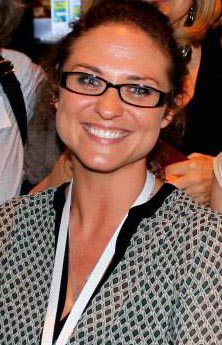Doctoral student highlight: Jamie Clem

Introduction by Dean Nicholas Mazza:
I have had the pleasure of serving as the instructor for two of Jamie Clem’s MSW classes and now as her major professor. Jamie’s commitment to her personal and professional development is truly exemplary. She not only appreciates and understands the interrelationship between teaching, research, and service but models it as a doctoral student. Jamie is indeed a unique doctoral student (and future faculty member) possessing impressive strengths in both the art and science of social work. This has been demonstrated in her work, research, and awards relating to substance abuse, nature-based and expressive arts interventions, women’s issues, and teaching. I have no doubt that through her knowledge, experience, and personal strengths, Jamie will continue to “make a difference” in our profession.
Get to Know Jamie :
What made you go into social work research? And what were you doing before entering your doctoral program?
I graduated our MSW program in 2008 and was hired at Morton Plant Hospital in Clearwater, FL, as a behavioral healthcare social worker (a large not for profit hospital where I completed my second clinical internship). There, I provided screening, brief intervention, and referral to treatment (SBIRT) for patients who had serious medical issues caused by an underlying mental health and/ or substance use disorder (i.e., suicide attempts, alcoholism-related malnutrition).
In May 2009, I received an email from Jim Hinterlong, the then-director of the doctoral program, encouraging me to apply for that coming fall cohort. I had always been interested in pursuing a PhD in social work. I was among the lucky few to actually enjoy Research Methods and fortunate enough to be involved in faculty research projects as an undergraduate and Master’s student. So when this opportunity presented itself, I knew I had to take full advantage it- even if I (admittedly) didn’t know exactly what I was getting myself into.
I saw, and continue to see, research as a powerful way to support clients. As social work researchers, we are inextricably linked to social work practice and, more importantly, our clients. To me research has always been a way to serve. Now, as I do research in the area of substance abuse, I can’t help but think of actual clients that I’ve met and how what I’m doing relates to them. I’ll read a study that reminds me of a specific person, and I’ll see their face in my head. It makes me smile because even though I don’t necessarily get to see the difference I’m making, I know that I’m helping.
Are they any notable scholarships, fellowships, awards or recognitions you’ve received?
I am very happy to say that as a PhD student, I’ve received the Herndon Scholarship as well as the John P. & Jane. W. Wakeman Memorial Scholarship for Arts in Social Work. However, I’m probably most proud of being nominated as Instructor of the Year by the FSU chapter of the Associate of Student Social Workers. Teaching is really important to me. It’s what fuels me.
What is your area of research interest?
My primary, general area of research is in substance abuse. I’m interested in exploring experiential and expressive interventions for individuals seeking treatment. I’m particularly drawn to the therapeutic use of the outdoors. I believe nature has many inherent healing qualities and can be a source of empowerment by overcoming natural obstacles.
How has your research evolved at CSW?
When I started teaching a couple of years ago I became really interested in evidence-based instructional methods. In addition to the work I do in substance abuse, I now have a second line of research that looks at social work education, specifically the use of experiential and expeditionary techniques.
What are you working on now?
I’ve volunteered for a local women’s residential substance abuse treatment facility while in the PhD program at FSU. This work has really influenced how I’ve looked at substance use, specifically in women. Right now I’m writing my dissertation. It’s on the gendered experience of the physical body during the development of a substance use disorder. I’m interested in learning how one’s relationship with and awareness of their physical body impacts drug and alcohol use. I’m hoping that this work will shed light into how that experience plays out. I think if we knew more about the specific factors that influence women’s substance use, we could design more effective gender-sensitive treatments.
What’s coming up for you this year?
In the next year, I’ll continue my work at the Florida Center for Prevention Research, where I am working on a project that looks at a school-based substance use prevention initiative. I will also finish my dissertation! I begin data collection in the spring and hope to graduate in the summer.

